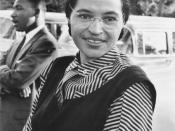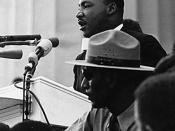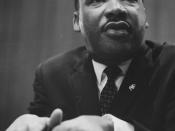Malcolm X, a self-educated [black] Muslim brought essentially two philosophies to the forefront of the civil rights movement of the 1950s and 1960s.
After an introduction to the nation of Islam and Elijah Muhammad while in prison, Malcolm developed a philosophy of independence and freedom for the Black race through racial and national separation. Along with this philosophy came a seemingly deep-set hatred for the white race with him often referring to them as a race of white devils.
His philosophy was met with much controversy. The theory of racial and national separation was in direct contrast with the theories of the Rev. Dr. Martin Luther King Jr. Dr. King's philosophy included non-violent protest and a vision of a raceless society. Although Malcolm's religion was an inherently peaceful one, he believed that if the Negroes were attacked in any way, it would be fine to use force in retaliation. Because of this view, many regarded Malcolm and the rest of the Black Muslims as militant.
According to Malcolm, the idea of integration was a futile one. He believed that the American socioeconomic system was unable to give Blacks what they were really looking for--"mass class mobility". Also, if integration were to happen, the best the Black race would be able to expect was an entry into the lowest levels of the working class.1 For this reason, he believed that the Negro race should embrace their African-ness and build the race up from within itself; a theory not dissimilar from those of Booker T. Washington and Marcus Garvey.
After a split from the so-called Black Muslim groups, headed by Elijah Muhammad, Malcolm embarked on his pilgrimage to Mecca--the Hajj. On his Hajj, Malcolm, or El-Hajj Malik El-Shabazz, saw a different side of the Islamic religion. What he saw was Islam...


